The 9th International Conference on Intercultural Communication (ICIC 2017) was held from Nov. 24-26 in Wuhan University. This year’s conference topics were focused on The Belt and Road Initiative, Multiculturalism & Intercultural Communication. Scholars from 17 countries and regions presented their latest research results and conducted in-depth discussions through 14 forums.
This was the 8th time for Wuhan University to host the International Conference on Intercultural Communication. This conference included an extensive range of papers written by scholars from 17 countries including 10 countries along the Belt and Road like Malaysia, Nigeria, Sri Lanka, Thailand, Pakistan, Singapore, Turkey, Iran, The United Arab Emirates and China, and other countries and regions such as America, France, Germany, Australia, Sweden, Hong Kong, Taiwan and so on.
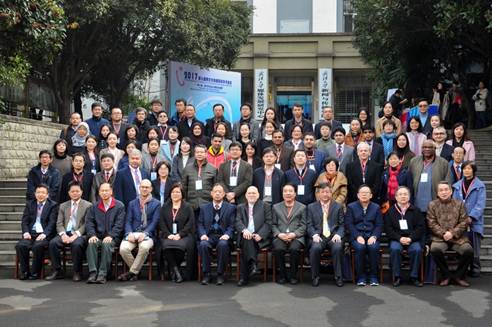
Photograph of all the scholars attending the conference
The ICIC 2017 focused on the theme of “community of shared interest”, “community of common destiny”, and “people of shared thoughts” included in The Belt and Road Initiative, seeking to resolve issues in intercultural interactions, intercultural conflicts and negotiations in multicultural practices.
Based on the above commitments, the 9th International Conference on Intercultural Communication covered the following topics: Practices and researches on intercultural communication from a global perspective; thoughts and strategies of intercultural communication on The Belt and Road; intercultural communication and multicultural practices; cultural spirits and social interaction of intercultural communication; global practices of intercultural communication; media representation and intercultural communication; the subject, discourse and effect of The Belt and Road communication; intercultural interpretation of The Belt and Road; Chinese explorations in the context of intercultural communication; branding and rhetoric in the intercultural communication of The Belt and Road; research on community of common destiny of cultural pluralism; theories and practices on intercultural communication; The Belt and Road and cultural communication in Central Asia; and The Belt and Road and the reflection of the paths of intercultural communication.
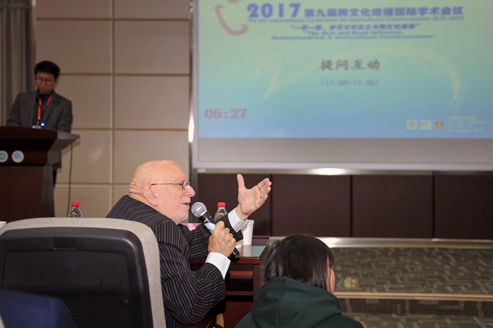
French professor Hugue Hotier in the main forum
Corresponding to each topic were 14 forums covering 64 papers in the course of 2 days. One of the features of this year’s conference was an independent session set up for Xinjiang University, which was of great significance according to Guo Jianbin, professor of Yunnan University, reviewer of the session. He said, lectures in this session gave him a new understanding/outlook of Xinjiang. “Voices of scholars from minorities like Xinjiang are important,” as Guo explained, “the biggest advantage of Xinjiang University is the location. Unlike outsiders, they are actually on the scene and thus have the context for research.” Further discussion noted the demarcation between intercultural communication and cross-border culture interaction. “Border of nation does not equal to boundary of culture”, said Guo.
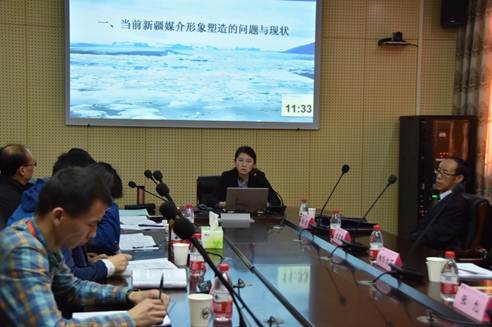
Session of Xinjiang University
The intercultural consensus on The Belt and Road Initiative was initially given by the conference convener Prof. Shan Bo based on the ideas of the scholars who participated in the conference. The consensus mainly included the following six points: multiculturalism should carry on amendment and reconstruction focusing on “communication”, thus to be the foundation of intercultural communication of The Belt and Road; the practice of intercultural communication of The Belt and Road should seek for wisdom and methods of communication among polyethnic groups in Chinese culture, while absorbing essence from other cultures to have the possibility of realizing “people-to-people bond”; intercultural communication of The Belt and Road should turn to cultural elements that are more diversified, localized and subdivided, understanding the validity and limits of mutual understanding, while promoting intercultural understanding in contextualization; the building of intercultural discourse of The Belt and Road needs to show openness, inclusiveness and complementarity, that is, the ability of moral practice in cross cultural communication; the intercultural communication of The Belt and Road needs to build basic principles of intersubjectivity, interculturalism and equal rights; the practices of multiculturalism in the intercultural communication of the Belt and Road is likely to create new innovative human knowledge and cultural interaction.
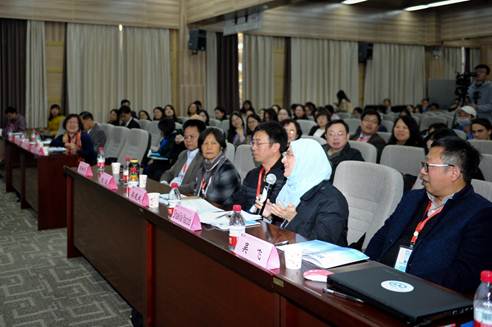
In-depth discussion among scholars
It is agreed by all participants that The Belt and Road Initiative seeks to go beyond the limitations of globalization and connects 65 countries along the line in order to provide a space for imagination and paths of practices for intercultural communication among mankind. The Chinese people are shouldering the responsibility and exploring new ways of multicultural practice. While in the process of exploration, human society needs to work together to handle challenges such as how to perceive, deconstruct and reshape our empirical world as well as the significance of intercultural communication and mutual understanding. It is expected to uphold the principle of equality between and within nations and cultures, to view the history of human civilization as an intercultural process of interaction and creative transformation.
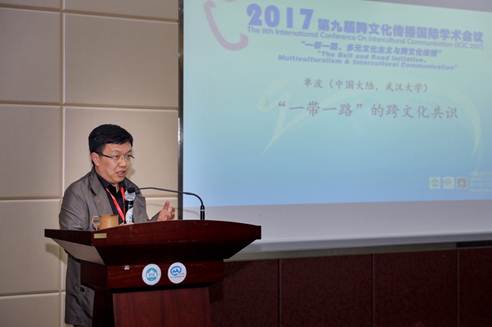
Prof. Shan Bo delivering the closing address
Prof. Shan Bo, the conference convener, Changjiang scholar and distinguished professor, director of the Center of Studies for Media Development, said that the consensus derived from the wisdom of all the scholars and their work in ICIC2017 are constructive. “It’s both our preliminary conclusion and the new beginning to view China and the world from the perspective of a community of human destiny.”
More than an academic feast, the conference was also “very well-organized” according to Prof. Shan Bo, who expressed satisfaction towards the whole proceedings of the conference. Zhang Yang, doctor of science in journalism and Prof. Shan Bo’s student, assisted in organizing the conference. He said, “Hardly was there time left for me to listen to the lectures, I am just occupied with logistic affairs.”

Book stand outside the conference hall
Students attending the conference also benefited a lot from it. Shen Yuxi, a first-year postgraduate student majoring in translation, said she came to the conference for its topic resembled her research interest, “Intercultural communication has always been accompanied by translation.” When asked about the most impressive lecture, Shen said “The most impressive lecture to me is one analyzing how social networks affect intercultural communication with the methodology of big data. The outcome is surely more convincing, compared with theories that we worked on in daily research.” After listening to the conference, Shen has made up her mind to learn programming.
Established from the cooperation between institutions of China and France since 2003, the International Conference on Intercultural Communication hosted by Wuhan University has become one of the most renowned conferences in this field domestically. Conference achievements have been published in Chinese, English and French, and included in 9 monographs. ICIC 2017 was hosted by the School of Journalism and Communication, the Center for Studies of Media Development of Wuhan University, the Research Centre for Social Development of Islamic Countries of Hebei University and the Think Tank of the Research Alliance of Countries along The Belt and Road (China).
(Photo by Gao Guijun, Wan Xuan)
Edited by Zheng Yayun, Edmund Wai Man Lai& Hu Sijia


